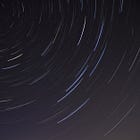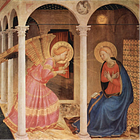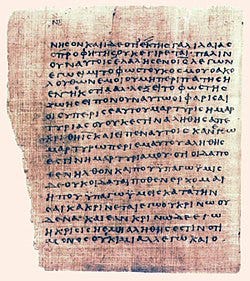In the beginning God created the heaven and the earth. And the earth was without form, and void; and darkness upon the face of the deep. And the Spirit of God moved upon the face of the waters. And God said, Let there be light…
—Genesis 1
Creation is the articulation of form in matter, of spirit in the letter of manifestation.
In the beginning was the Word,1 and the Word was with God, and the Word was God. The same was in the beginning with God. All things were made by him; and without him was not any thing made that was made.
—John 1
Greek λóγος, or l ó g o s, often rendered in English as “Word.” But “word” is much narrower in semantic scope than λóγος so either it is a poor translation of λóγος or language is much more than we think.
This characteristically vatic statement from the Pre-Socratic philosopher Heraclitus gives a sense for the cosmic scope of the term:
Though this Word (λóγος) is true evermore, yet men are as unable to understand it when they hear it for the first time as before they have heard it at all. For, though all things come to pass in accordance with this Word, men seem as if they had no experience of them, when they make trial of words and deeds such as I set forth, dividing each thing according to its kind and showing how it is what it is. But other men know not what they are doing when awake,2 even as they forget what they do in sleep.
Logos (λóγος), as can be seen, resists direct translation into English, as comparable words like Tao (道) and Dharma (धर्म) in Chinese and Sanskrit, respectively. Incidentally, when The Gospel According to John is translated into these languages, again respectively, these are precisely the terms employed to render it. English words like “speech,” “word,” “language,” “logic,” “reason,” “intelligence,” “order,” “definition,” “principle,” “harmony,” and “ordering principle of the universe” (i.e. that which makes the universe a cosmos and not a chaos) are like branches on the tree of logos.
The heavens declare the glory of God; and the firmament sheweth his handywork. Day unto day uttereth speech, and night unto night sheweth knowledge. There is no speech nor language, where their voice is not heard.
—19th Psalm
Creation is a mouthpiece of the Most High; the stars are his consonants and the planets his vowels.
There is a great book, the very appearance of created things. Look above you! Look below you! Note it. Read it. God, whom you want to discover, never wrote that book with ink. Instead He set before your eyes the things that He had made!2
—St. Augustine of Hippo
Everything on Earth bears the seal of Heaven.
For this whole sensible world is a kind of book written by the finger of God, that is, created by divine power, and each creature is a kind of figure, not invented by human determination, but established by the divine will to manifest and in some way signify the invisible wisdom of God.
—Hugh of St. Victor3
Nature rehearses these words like “a child,” as Rilke says, “who knows its poems by heart.” But the original composition is not terminated, but ongoing, carried forward now in collaboration with man, in, by, and upon the human soul. These verses are “written,” as the Apostle sayeth, “not with ink, but with the Spirit of the living God; not in tables of stone, but in fleshy tables of the heart.”4 Like the apprentices to whom the Renaissance master would delegate the completion of his masterpiece, so we are called to take part in the ongoing composition.
Believe me, you will find more lessons in the woods than in books. Trees and stones will teach you what you cannot learn from masters.
—St. Bernard of Clairvaux
The whole intelligible world seems mystically imprinted on the whole sensible world in symbolic forms, for those who are capable of seeing it, and conversely the whole sensible world subsists within the whole intelligible world, being rendered simple, spiritually and in accordance with intellect, in its rational principles. The sensible is in the intelligible in rational principles, and the intelligible is in the sensible in types.
—St. Maximus the Confessor5
The answer to all the world’s mysteries is already arrayed before us, only we don’t know what to look for. We don’t understand the question and hence can’t recognize the answer. The highest truth is always there for us, only we are not there for it. God speaketh constantly, only to hearts that are hardened. “Those with ears, let them hear.” God soweth the word in us day by day, moment by moment: may it fall on good ground, “and brought forth fruit, some an hundredfold, some sixtyfold, some thirtyfold.”
God like a good teacher, took care to make two most excellent writings for us, that he might educate us perfectly…. These writings are encased in a double book: namely, the book of the Creation [in libro creaturae] and the Book of Scripture.
—Saint Thomas Aquinas6
Thus God manifested it [Wisdom] to them either from within by endowing them with a light or from without by presenting visible creatures, in which, as in a book, the knowledge of God may be read.
—Saint Thomas Aquinas7
God composed two books: one written within, which is the Eternal Art and Wisdom of God; the other written without, which is the perceptible world.
—Bonaventure8
Look, Nature is living book/Uncomprehended, yet not incomprehensible.
(Sieh, so ist Natur ein Buch lebendig/Unverstanden, doch nicht unverständlich.)
—Goethe, ‘Sendschreiben’
The mystics claim that their ecstasy reveals to them a circular chamber containing a great circular book, whose spine is continuous and which follows the complete circles of the walls; but their testimony is suspect, their words obscure. This cyclical book is God.
—Jorge Luis Borges, “The Library of Babel”9
Their testimony must always by “suspect,” their words “obscure” because they are not God. Human words are related to the things but never identical with it. If they were, they would cease to be useful to us just as a map that were identical with its territory would no longer function as a map. Words disclose the thing, intend the thing, indicate the thing, but can never embody it and be embodied by it in the mutual communion of matter and spirit that we call “being.” That’s the different between Christians, who view the books of the Bible as testaments to the Word of God, which is Christ, and Muslims who view the Koran as the Word of God simpliciter. What Jesus Christ is to Christians, the Koran is to Muslims. Truth is personal in the Christian view and literal is the Islamic one.
Then will the other great Bible of God, the Book of Nature, become transparent to us, when we regard the forms of matter as words, as symbols, valuable only as being the expression, an unrolled but yet a glorious fragment, of the wisdom of the Supreme Being.10
—Samuel Taylor Coleridge
The liber naturae, The First Testament, which God spoke into being “in the beginning.” We think, to begin with, that what something is and what it means are two things. But when we awaken from “Newton’s sleep”11 and attain to the stereoscopic vision between the eye of the head and the eye of the heart, then we will see that they are one thing.
The sky, the sea, the sun, the stars, human beings, and all that which surrounds us is likewise something that we read.12
—Simone Weil
Sensory encounters are the syllables of Nature’s Word.
A life in harmony with nature, the love of truth and of virtue, will purge the eyes to understand her text. By degrees we may come to know the primitive sense of the permanent objects of nature, so that the world shall be to us an open book, and every form significant of its hidden life and final cause.
—Ralph Waldo Emerson
We have to focus our eyes to read a text and attune to things to hear them speak.
Every appearance of Nature was a Word—a sign, symbol and pledge of a new, secret, inexpressible but all the more inward clarification, communication and community of divine energies and Ideas.13
—Johann Georg Hamann
“Nothing is concealed throughout the universe....Future generations will be able to understand...if they devote efforts to spiritual practice by seeing the universe through words and letter, and words and letters through the universe.”
—Dōgen
Greek λóγος, or l ó g o s, often rendered in English as “Word”; cf. John 1.1:
In the beginning was the Word (lógos), and the Word was with God, and the Word was God.1
and Heraclitus:
Though this Word (lógos) is true evermore, yet men are as unable to understand it when they hear it for the first time as before they have heard it at all. For, though all things come to pass in accordance with this Word, men seem as if they had no experience of them, when they make trial of words and deeds such as I set forth, dividing each thing according to its kind and showing how it is what it is. But other men know not what they are doing when awake,2 even as they forget what they do in sleep.
Logos (λóγος) resists direct translation into English, as comparable words like Tao (道) and Dharma (धर्म) in Chinese and Sanskrit, respectively. English words like “speech,” “word,” “language,” “logic,” “reason,” “intelligence,” “order,” “definition,” “principle,” “harmony,” and “ordering principle of the universe” (i.e. that which makes the universe a cosmos and not a chaos) are like branches on the tree of logos.
Augustine, The Essential Augustine, 123.
De Tribus Diebus 4.3. Coolman, Boyd Taylor, and Dale M. Coulter, eds. 2010. Trinity and Creation: A Selection of Works of Hugh, Richard and Adam of St Victor, Victorine Texts in Translation. Turnhout: Brepols. 2010, p. 63.
Corinthians 3:3
Mystagogia
Sermons 194B-95A
Commentary on Romans C1.L6.n117.2
Breviloquium 2.11.2
Borges, Ficciones, trans. Andrew Hurely.
Coleridge, Philosophical Lectures of 1818, 'lecture xii.
William Blake:
Now I a fourfold vision see,
And a fourfold vision is given to me;
’Tis fourfold in my supreme delight,
And threefold in soft Beulah’s night,
And twofold always.—May God us keep
From single vision, and Newton’s sleep!
Weil, “Essay on the Concept of Reading”
Hamann, Knight of the Rose Cross









This goes in the category of 'saved' posts, Max. Thank you.
Rudolf Steiner cites John 1:1-5, with a slight variation, but it is a significant one:
In the beginning was the Word, and the Word was with God and the Word was a God.
The same was in the beginning with God.
All things came into being through It and save through It was not anything made that was made.
In It was Life and Life was the Light of men.
And the Light shone into the darkness but the darkness comprehended it not.
https://rsarchive.org/Lectures/GA103/English/AP1962/19080522p01.html
This would seem to more than imply that God creates the first seven days, and then the Lord God comes on the scene, coincident with this verse, Genesis 2:4. "This is the account of the heavens and the earth when they were created, in the day that the Lord God made earth and heaven." Thus, the Lord God is this other God with the creative power of the Word (Logos). Anthroposophy defines this other God, as Jahve, or Jehova, who is also Christ in His outer dimension.